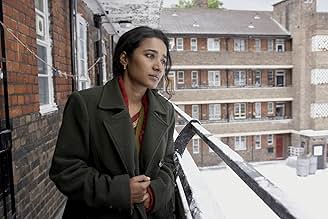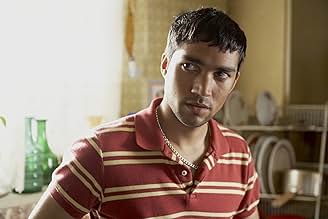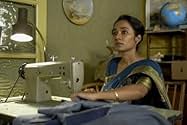AVALIAÇÃO DA IMDb
6,6/10
3,3 mil
SUA AVALIAÇÃO
Adicionar um enredo no seu idiomaIn 1980s London, Nazneem, a young Bangladeshi woman, feels her soul is quietly dying in her arranged marriage, until the day hot-headed Karim comes knocking at her door.In 1980s London, Nazneem, a young Bangladeshi woman, feels her soul is quietly dying in her arranged marriage, until the day hot-headed Karim comes knocking at her door.In 1980s London, Nazneem, a young Bangladeshi woman, feels her soul is quietly dying in her arranged marriage, until the day hot-headed Karim comes knocking at her door.
- Indicado para 1 prêmio BAFTA
- 3 vitórias e 5 indicações no total
- Direção
- Roteiristas
- Elenco e equipe completos
- Produção, bilheteria e muito mais no IMDbPro
Enredo
Você sabia?
- CuriosidadesAll three the lead actors playing in the movie, none are of Bangladeshi origin.
- Citações
Nazneen Ahmed: [narrating] No one spoke of our mother's death... and I remembered her saying: "If Allah wanted us to ask questions, he would have made us men."
- ConexõesFeatures Desencanto (1945)
- Trilhas sonorasOmar Sonar Bangla
Lyrics by Rabindranath Tagore
Avaliação em destaque
As I started watching Brick Lane my heart soared. The beauty of its appreciation of nature (Bangladeshi scenes from the lead character's memory) reminded me of the masterpieces of Deepa Mehta if not of Satyajit Ray. It tells of a young girl whose father marries her off to an educated Bangladeshi back in London. Displaced from her homeland, her heart is full of secret sorrow until she finds herself attracted to a man younger than her husband and much closer to her own age. From that point she begins much soul searching, examining her own identity and place in the world.
"For us," says director Sarah Gavron, "'Brick Lane' as a title symbolises a sanctuary to successive waves of immigrants searching for home. That search, rather than the bricks and mortar of the street, is at the heart of the story." I admit that her description helps me to have a better view of the film but I wish it had been more apparent in the footage.
A beautiful love story develops, with a subplot about resisting Islamic extremism. Yet I soon felt as if I were watching a kind of updated Jane Austen novel where the Brick Lane (East London) Bangladeshi community were used simply to provide a fresh plot device.
I read some of the adverse comments from Brick Lane spokespeople that plagued the film's opening. I didn't feel I could relate to them. I found nothing offensive in the film. Except it seemed to me somehow a curiously British portrayal of Bangladeshis. There is plenty of reference to Bangladeshi or Muslim issues but authenticity seems a little uneven. Translation of a prayer is touching. But a reference to the Muslims that died in Partition (at the end of colonial rule) seems less heartfelt. The young daughter, who has only ever known British ways, is a very convincing character on the other hand. I am tempted to wish that the original prize-winning writer had focused her efforts more on the daughter, someone much closer to her own diaspora experience.
As a film it succeeds. Exquisite photography and bundles of unarticulated emotion sweep us along at a heady pace. As a glimpse of another culture it is on less secure ground. The people claiming it misrepresented them may not have been statistically significant but why did it stir up so much trouble? Consider this. When Gurinder Chadha made Bride and Prejudice, she focused on the positive qualities of the two protagonists and cultures (India and America). When Deepa Meetha made Water, she focused on the positive strengths of the women on whose behalf the film was (in part) a protest. Sarah Gavron's heroine in Brick Lane, on the other hand, is almost an entirely a passive recipient of circumstance. We suspect she is a lovely person, but it needs more than some idyllic childhood memories of running through paddy fields to pinpoint the beauty within her. Much as the director's comment gives a higher purpose and reading to the film, it is not so obvious from viewing alone. Her comment about a sanctuary is a very spiritual one - perhaps even capable of uniting Muslims and Jews one day. But although her protagonist's husband does make reference to it at a Muslim meeting it could too easily be missed. Sadly, but not surprisingly, some audiences have reacted to the extremely personal (but more negative) images of her trapped and isolated woman.
For a film with a serious intent, Brick Lane stops short at quality entertainment. Compare Mira Nair's epic The Namesake, which asks questions about identity and answers them. Or the way Satyajit Ray looks at home and identity through simple observation If Sarah Gavron had wanted to accomplish anything as grand as the search for sanctuary in a foreign land, her scope needed to be more ambitious.
"For us," says director Sarah Gavron, "'Brick Lane' as a title symbolises a sanctuary to successive waves of immigrants searching for home. That search, rather than the bricks and mortar of the street, is at the heart of the story." I admit that her description helps me to have a better view of the film but I wish it had been more apparent in the footage.
A beautiful love story develops, with a subplot about resisting Islamic extremism. Yet I soon felt as if I were watching a kind of updated Jane Austen novel where the Brick Lane (East London) Bangladeshi community were used simply to provide a fresh plot device.
I read some of the adverse comments from Brick Lane spokespeople that plagued the film's opening. I didn't feel I could relate to them. I found nothing offensive in the film. Except it seemed to me somehow a curiously British portrayal of Bangladeshis. There is plenty of reference to Bangladeshi or Muslim issues but authenticity seems a little uneven. Translation of a prayer is touching. But a reference to the Muslims that died in Partition (at the end of colonial rule) seems less heartfelt. The young daughter, who has only ever known British ways, is a very convincing character on the other hand. I am tempted to wish that the original prize-winning writer had focused her efforts more on the daughter, someone much closer to her own diaspora experience.
As a film it succeeds. Exquisite photography and bundles of unarticulated emotion sweep us along at a heady pace. As a glimpse of another culture it is on less secure ground. The people claiming it misrepresented them may not have been statistically significant but why did it stir up so much trouble? Consider this. When Gurinder Chadha made Bride and Prejudice, she focused on the positive qualities of the two protagonists and cultures (India and America). When Deepa Meetha made Water, she focused on the positive strengths of the women on whose behalf the film was (in part) a protest. Sarah Gavron's heroine in Brick Lane, on the other hand, is almost an entirely a passive recipient of circumstance. We suspect she is a lovely person, but it needs more than some idyllic childhood memories of running through paddy fields to pinpoint the beauty within her. Much as the director's comment gives a higher purpose and reading to the film, it is not so obvious from viewing alone. Her comment about a sanctuary is a very spiritual one - perhaps even capable of uniting Muslims and Jews one day. But although her protagonist's husband does make reference to it at a Muslim meeting it could too easily be missed. Sadly, but not surprisingly, some audiences have reacted to the extremely personal (but more negative) images of her trapped and isolated woman.
For a film with a serious intent, Brick Lane stops short at quality entertainment. Compare Mira Nair's epic The Namesake, which asks questions about identity and answers them. Or the way Satyajit Ray looks at home and identity through simple observation If Sarah Gavron had wanted to accomplish anything as grand as the search for sanctuary in a foreign land, her scope needed to be more ambitious.
- Chris_Docker
- 11 de mar. de 2008
- Link permanente
Principais escolhas
Faça login para avaliar e ver a lista de recomendações personalizadas
- How long is Brick Lane?Fornecido pela Alexa
Detalhes
- Data de lançamento
- País de origem
- Centrais de atendimento oficiais
- Idiomas
- Também conhecido como
- Um Lugar Chamado Brick Lane
- Locações de filme
- Empresas de produção
- Consulte mais créditos da empresa na IMDbPro
Bilheteria
- Faturamento bruto nos EUA e Canadá
- US$ 1.095.398
- Fim de semana de estreia nos EUA e Canadá
- US$ 47.124
- 22 de jun. de 2008
- Faturamento bruto mundial
- US$ 3.796.190
- Tempo de duração1 hora 42 minutos
- Cor
- Mixagem de som
- Proporção
- 2.35 : 1
Contribua para esta página
Sugerir uma alteração ou adicionar conteúdo ausente
































